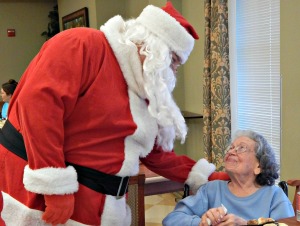
“Typically, the holidays are full of joy, celebration and family,” said Suzi Bottlinger, director of social services for the Sunset Home in Clifton, Texas. “However, for many people in our Health Center, the holidays have a different meaning. They may be away from their loved ones and may not physically be able to go to their family’s home for the holidays. This can create stress and depression.”
For the elderly, the holidays may serve as a reminder of friends who have passed away, their distance from loved ones, lack of visitation (if they are in an assisted living center) or the inability to take part in many holiday events. However, family members can do much to help make the holidays a more enjoyable time for their elder loved ones.
During the holidays, families are encouraged to visit their loved ones, though it may not be the same traditions as they are accustomed to. “Being acknowledged and remembered during the holidays remains very important to people living in our Health Center, whether it be a short-term or long-term stay,” said Mrs. Bottlinger. “Spending time with your loved one is one of the most important things you can do. From taking a trip down memory lane with family photos to listening to their favorite music, people of all ages enjoy reminiscing.” Other activities could include reading aloud from a newspaper, magazine or church bulletin, assisting with writing holiday cards and letters, doing some holiday shopping from catalogs or decorating their apartment or room.
“Families are also encouraged to bring food, presents, etc. to be able to include their loved ones in the holiday celebrations,” said Mrs. Bottlinger. “Interactions with friends and family are integral to the ongoing mental health wellness of people in the Health Center, and holidays are no different. Being included and loved are emotional needs that should be met throughout one’s live.”
For individuals struggling with cognitive loss, the holidays could create a special sense of loss because of the changes he or she has experienced. If you are visiting your loved one for the first time in a care community, give yourself a chance to adjust. You could even ask a manager or administrator what to expect in advance so, if you have not seen your loved one in awhile, you will not be shocked and upset during the visit.
If caring for your loved one at home or if they are placed in a health center, discussing holiday celebrations with relatives and close friends who may be visiting in advance is imperative. A face-to-face meeting, conference call or letter will help family members understand the situation and have realistic expectations. According to the Alzheimer’s Association, a helpful letter could read, “I’m writing to let you know how things are going at our house. While we’re looking forward to your visit, we thought it might be helpful if you understood our current situation before you arrive.”
Encourage visitors to refrain from asking the person with cognitive loss, “Do you remember me?” Often the person with cognitive loss may remember the person’s face, but not the name. By asking this, it only emphasizes their memory loss, which is stressful. Encourage visitors to automatically introduce themselves upon arriving for the visit, such as “Hi Aunt Mae, I’m your niece Julie, it’s so good to see you!” This lets them know who you are and gives them a welcoming feeling, instead of being tested from the beginning of the visit.
It’s important to involve the person suffering with cognitive loss in holiday planning. With this in mind, it may be beneficial to include them in the preparation of holiday festivities. You may want to begin slowly by asking the person to help you prepare food, wrap packages, hang decorations or set the table. According to the Alzheimer’s Association, families should avoid using candies, artificial fruits/vegetable or other edible decorations. Also, blinking lights may confuse the person. Minimizing stimulation is also very important during events or holidays. Too many people visiting at once, music playing while trying to visit or too many people talking at once may have a negative effect on the person with cognitive loss. Short visits with small groups are encouraged.
Maintaining the person’s normal routine so that the holiday preparations do not become disruptive or confusing is critical. Taking on too much at one time can be stressful for them and the caregiver. The Alzheimer’s Association recommends building on past traditions and memories to help the loved one feel comfort in familiar activities.
Gift giving can prove to be challenging when buying for your elderly loved one, but there are useful gift ideas. The Alzheimer’s Association suggests practical gifts such as identification bracelets, comfortable, easy-to-remove clothing, audio tapes of their favorite music and photos/videos of family members. Other gift options could include subscriptions to magazines or gift certificates for long distance telephone service. On the other hand, it would be beneficial to warn family members about difficult or unsafe gifts: tools, challenging board games, complicated electronics, etc.
While visits are important during the holidays, families are encouraged to visit their loved ones throughout the year. “It’s important that families take an active role in helping seniors who live alone or in a care community feel valued and appreciated,” said Mrs. Bottlinger. “The time you spend together will be cherished forever.”
Article by Andrea Hikel, Lutheran Sunset Ministries’ marketing and community relations director.